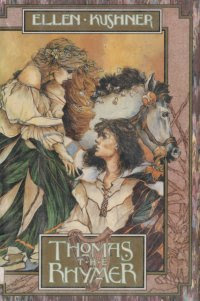 Boy's Life
Boy's Lifeby Robert R. McCammon
1992 World Fantasy Award Winner for Best Novel
I feel like it's reprise week for me. First Thomas the Rhymer and now Boy's Life: they both have at their heart something that I hated in other novels I reviewed recently and yet they do it right. Boy's Life is a meandering thick novel that dances around it's plot wandering off into its own digressions and yet McCammon makes it work.
While accompanying his father on his milkman route a young boy sees a car roll off the road into a deep lake. His father tries to rescue the driver but finds that he has been brutally beaten and then handcuffed to the steering wheel. Over the course of the next year they try to figure out who the victim was and why it happened.
That might be the description of the plot that fits on the dust jacket but it's not what Boy's Life is about. What the book is really about is just what the title says: boy's life. They live in a small town in Mississippi during the early 60's and around every corner is some secret: an ancient river monster, a hundred year old voodoo queen, a gunslinger who saved Wyatt Earp at the OK Corral, a spectral hot rodder, and the more mundane but deadlier threat of the Klu Klux Klan. The magic in Boy's Life rarely rises to the surface but it's there lurking behind everything.
Instead of a straightforward plot McCammon recounts a year where his protagonist finds everything. Each chapter is its own story and usually they only tangentally come together. It took me a bit of time to get into the relaxed groove of McCammon's narration and once I did the story came alive for me. It worked this time unlike other rambling novels because while things like a spectral hot rod might not have affected the main plot they were complete plots in themselves. Boy's Life might be thought of as one novel and twenty-five short stories welded together.
This wouldn't have worked nearly as well if McCammon didn't have a deft hand with his characters. With a cast that balloons as each new chapter of story is spun he never has a problem with the characters blending together; there's multiple flawed preachers, for example, that you would never be able to mistake for one another. The characters are never as simple as a two or three word archetype could make them appear; the bullies are very similar to other bullies with the same broken homelife and yet they carry a different kind of menace than bullies usually do. For having a cast as huge as McCammon does creating unique personalities for them is a great achievement.
All of this is helped along by a strong narrative voice from the first person perspective of the boy at the center of these adventures. McCammon puts it in the perspective of an adult writer looking back which avoids the problem of an eleven year old telling a story this well and at the same time it makes the wonders of his small town more personal.
The book's greatest strengths are its greatest flaws. It is slow and leasurely paced and filled with digressions into territory that other authors have thoroughly mapped. I wound up appreciating the ride however I know that some readers may not care for the book. There are many other books featuring quirky and magical small towns, many other books about life in the deep south during the early 1960's, and many other books that are childhood adventure memoirs. I think that McCammon's efforts in Boy's Life are exceptional which is why I recommend it. Boy's Life reminded me a lot of children's adventure stories of my youth only with a darker edge and the fantastic sneaking in; I suppose it's success will depend on how much that kind of nostalgia can draw you in.

